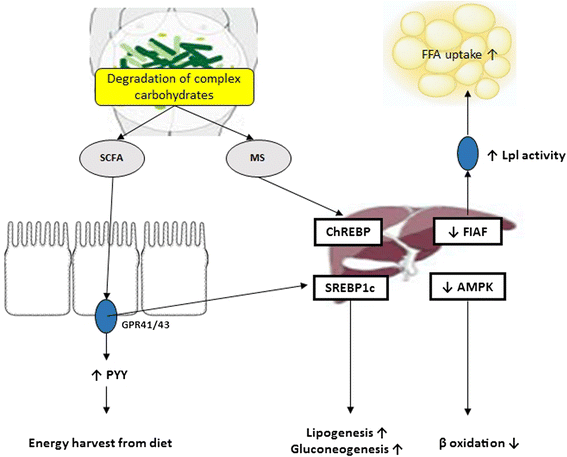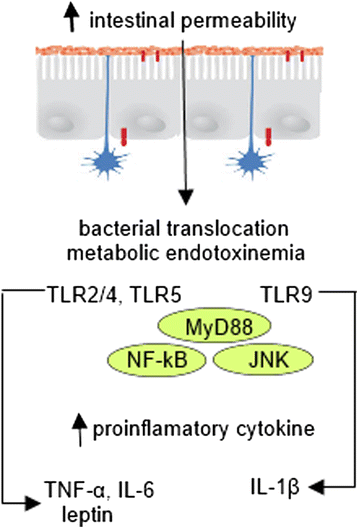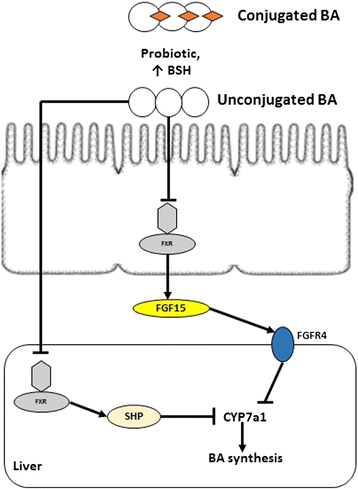Pathophysiological role of host microbiota in the development of obesity
- PMID: 27105827
- PMCID: PMC4841968
- DOI: 10.1186/s12937-016-0166-9
Pathophysiological role of host microbiota in the development of obesity
Abstract
Overweight and obesity increase the risk for a number of diseases, namely, cardiovascular diseases, type 2 diabetes, dyslipidemia, premature death, non-alcoholic fatty liver disease as well as different types of cancer. Approximately 1.7 billion people in the world suffer from being overweight, most notably in developed countries. Current research efforts have focused on host and environmental factors that may affect energy balance. It was hypothesized that a microbiota profile specific to an obese host with increased energy-yielding behavior may exist. Consequently, the gut microbiota is becoming of significant research interest in relation to obesity in an attempt to better understand the aetiology of obesity and to develop new methods of its prevention and treatment. Alteration of microbiota composition may stimulate development of obesity and other metabolic diseases via several mechanisms: increasing gut permeability with subsequent metabolic inflammation; increasing energy harvest from the diet; impairing short-chain fatty acids synthesis; and altering bile acids metabolism and FXR/TGR5 signaling. Prebiotics and probiotics have physiologic functions that contribute to the health of gut microbiota, maintenance of a healthy body weight and control of factors associated with obesity through their effects on mechanisms that control food intake, body weight, gut microbiota and inflammatory processes.
Keywords: Bile acid metabolism; Endocannabinoid system; FIAF; FXR; Gut microbiota; Innate immunity; Intestinal permeability; Metabolic inflammation; Obesity; Short-chain fatty acids; TLRs.
Figures
Similar articles
-
[Physiological patterns of intestinal microbiota. The role of dysbacteriosis in obesity, insulin resistance, diabetes and metabolic syndrome].Orv Hetil. 2016 Jan 3;157(1):13-22. doi: 10.1556/650.2015.30296. Orv Hetil. 2016. PMID: 26708682 Review. Hungarian.
-
The role of the gut microbiota in energy metabolism and metabolic disease.Curr Pharm Des. 2009;15(13):1546-58. doi: 10.2174/138161209788168164. Curr Pharm Des. 2009. PMID: 19442172 Review.
-
Gut microbiota and the development of obesity.Nutr Hosp. 2012 Sep-Oct;27(5):1408-14. doi: 10.3305/nh.2012.27.5.5887. Nutr Hosp. 2012. PMID: 23478685 Review.
-
The gut microbiota, obesity and insulin resistance.Mol Aspects Med. 2013 Feb;34(1):39-58. doi: 10.1016/j.mam.2012.11.001. Epub 2012 Nov 16. Mol Aspects Med. 2013. PMID: 23159341 Review.
-
Gut microbiota, intestinal permeability, obesity-induced inflammation, and liver injury.JPEN J Parenter Enteral Nutr. 2011 Sep;35(5 Suppl):14S-20S. doi: 10.1177/0148607111413772. Epub 2011 Aug 1. JPEN J Parenter Enteral Nutr. 2011. PMID: 21807932 Review.
Cited by
-
Integrative Longitudinal Analysis of Metabolic Phenotype and Microbiota Changes During the Development of Obesity.Front Cell Infect Microbiol. 2021 Aug 3;11:671926. doi: 10.3389/fcimb.2021.671926. eCollection 2021. Front Cell Infect Microbiol. 2021. PMID: 34414128 Free PMC article.
-
Polyunsaturated fatty acids-rich dietary lipid prevents high fat diet-induced obesity in mice.Sci Rep. 2023 Apr 5;13(1):5556. doi: 10.1038/s41598-023-32851-7. Sci Rep. 2023. PMID: 37019935 Free PMC article.
-
Relationship Between Mutans Streptococci and Lactobacilli in the Oral Cavity and Intestine of Obese and Eutrophic Children With Early Childhood Caries-Preliminary Findings of a Cross-Sectional Study.Front Pediatr. 2020 Dec 11;8:588965. doi: 10.3389/fped.2020.588965. eCollection 2020. Front Pediatr. 2020. PMID: 33363062 Free PMC article.
-
Tissue-specific epigenetics of atherosclerosis-related ANGPT and ANGPTL genes.Epigenomics. 2019 Feb;11(2):169-186. doi: 10.2217/epi-2018-0150. Epub 2019 Jan 28. Epigenomics. 2019. PMID: 30688091 Free PMC article.
-
Chronic Effect of a Cafeteria Diet and Intensity of Resistance Training on the Circulating Lysophospholipidome in Young Rats.Metabolites. 2021 Jul 22;11(8):471. doi: 10.3390/metabo11080471. Metabolites. 2021. PMID: 34436412 Free PMC article.
References
Publication types
MeSH terms
Substances
LinkOut - more resources
Full Text Sources
Other Literature Sources
Medical




